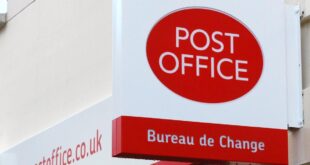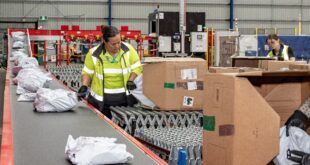During his time as governor of the Bank of England, Mark Carney was famously likened to an “unreliable boyfriend”. To continue that analogy, in his new role as chairman of Brookfield, the Canadian property giant, the girl he has been speaking to over summer has run off with someone else.
Brookfield has been flirting for weeks with Tritax EuroBox, the owner of £1.2 billion of delivery depots, distribution centres and logistics hubs around Europe.
The pair first went public with their talks back in June, but after all that graft, Segro has swooped in at the last minute and wooed EuroBox’s board with a £552 million all-share offer.
• Segro agrees all-share takeover of Tritax EuroBox
For the usually mundane world of big metal sheds, this is as close to a soap opera as it gets. Segro, the owner of the Slough Trading Estate — home of the fictional Wernham Hogg in The Office sitcom — has outmanoeuvred Brookfield, one of the country’s biggest landowners.
Segro is no small fish; with a stock market value of almost £12 billion, it is the largest real estate investment trust in Europe. It owns £18 billion of warehouses in the UK and Europe and counts Amazon, Royal Mail, DHL and Marks & Spencer among its customers.
As it stands, the EuroBox board is recommending that shareholders accept Segro’s offer, but in true soap opera style, some believe there remains a chance that Eurobox will go off with someone else.
“An offer for EuroBox is no surprise but we did not expect Segro to be the bidder. Perhaps a narrow window still exists for a competing bid?” James Carswell, a commercial property industry analyst at Peel Hunt, said.
Mark Carney, the Bank of England’s former governor, is the chairman of Brookfield
JUSTIN TALLIS/AP
He thinks the door has been left ajar because Segro’s offer values each EuroBox share at about 68.4p — only 3 per cent above what they were trading at when markets closed on Tuesday. Investors typically want a chunkier premium before agreeing to sell out.
EuroBox has already confirmed that before accepting Segro’s offer it had held discussions with a “number of different parties”. Indeed, Brookfield could yet come back with a higher offer. Under City takeover rules, the Canadian investor has another few weeks to decide whether to make a firm bid, and it has not ruled out doing so.
Few expected Segro to make a tilt at EuroBox, but a tie-up between the two is not that far-fetched. As with most types of commercial property, amid spiralling interest rates, warehouses have tumbled in value over the past couple of years, down about 25 per cent since spring 2022.
David Sleath, Segro’s chief executive, has been saying for a while that the market has bottomed out and that values should soon start rising again. That was his pitch to investors in February when Segro tapped them for another £900 million; money he wanted to build and buy more warehouses.
If his call proves correct there is a good chance that EuroBox would command a higher price in, say, six months’ time. Segro’s offer is at a small premium to the share price but at a 14 per cent discount to EuroBox’s net asset value.

David Sleath, chief executive of Segro, reckons the commercial property market is on the rise again after hitting its lowest point
SONJA HORSMAN FOR THE TIMES
EuroBox shares have traded at a perpetual discount to net asset value for a few reasons, including concerns about how much further commercial property values will fall. If Sleath is right and valuations have fallen as far as they are going to, then Segro is getting EuroBox’s portfolio for 14 per cent less than external valuers have assessed it to be worth. Soumen Das, Segro’s chief financial officer, said it was a “pretty healthy and attractive price” that Segro had agreed.
Aside from the wider market malaise that has persisted for almost two years now, EuroBox has suffered from being “subscale”. Analysts have said that trying to convince big investors to put their money into a property company worth less than £2 billion is tough.
Their concern is that selling shares in smaller landlords is harder because there are fewer investors ready to step in and buy. One fund manager likens them to a “lobster pot; the lobster can get in, but it’s hard to get out”.
Robert Orr, the chairman of Tritax EuroBox, referred to that problem on Wednesday when explaining that shareholders will be able to “[take] advantage of Segro’s significantly greater trading liquidity”.
• Why commercial property values have hit the floor
There is more to Segro’s interest than thinking it can get EuroBox on the cheap. Land on which to build new sheds is hard to come by and there are few companies available to buy that can match the size of EuroBox’s portfolio, even if some deem it to be subscale.
“EuroBox has got a really high-quality, modern portfolio of big-box assets around Europe,” Das explained. “It’s always tough to find assets in markets like Germany and Holland, so this is an unusual chance to do that.”

The Yodel warehouse at Segro East Midlands Gateway Logistics Park off the M1
ALAMY
As in the UK, warehouse rents in Europe have jumped since the pandemic, fuelled by an increase in online shopping and more businesses “nearshoring” their production facilities and stockpiles (bringing them closer to home).
There have been concerns recently about how long that rental growth story can last — Segro shares have fallen 8 per cent over the past couple of months — but Das is adamant that the balance of supply and demand remains in Segro’s favour.
“What we’ve seen over the past 18 to 24 months is the normalisation of market conditions from those exceptional levels during the pandemic,” he said. “The really good news is that supply of new space is pretty subdued, and therefore you’ve got healthy market conditions.”
Source link



